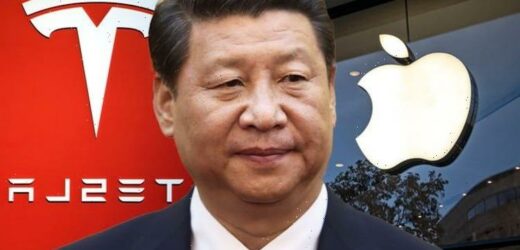Steve Baker says China 'isn't ready to do deal at COP26'
We use your sign-up to provide content in ways you’ve consented to and to improve our understanding of you. This may include adverts from us and 3rd parties based on our understanding. You can unsubscribe at any time. More info
Local media say “unexpected” and “unprecedented” electricity cuts in the provinces of Jilin, Liaoning and Heilongjiang, were caused by power rationing during peak hours. Millions of homes in eastern China are now without power and factories have been forced to shut down too. Tech manufacturers in the eastern and southeastern coasts of the country, including Apple and Tesla, are said to be feeling the impacts. Apple Inc supplier Unimicron Technology Corp (UTC) has said that they have put a stop to production at three Chinese factories to comply with the new emission standards set by Xi Jinping’s government.
China has reportedly tightened its “emission standards” for heavy industries and this has led to a steep decline in production.
This poses a threat to supply chains, which could break at the peak season for the sale of electronic goods and items in China.
UTC said in a statement that the decision was taken to comply with the “electricity limiting policy” of China.
A host of other companies, including a parts supplier to Tesla, were also told to halt production this week.


Making matters worse is said to be a coal shortage.
The lack of power has enraged the public and has also cause down shut downs to traffic lights and 3G mobile phone coverage in some areas.
A utility in Jilin also warned that the power shortages could disrupt water supplies at any time.
Chinese state broadcaster CCTV has also said a factory in Liaoning had to rush 23 workers to hospital as a result of carbon monoxide poisoning when ventilators suddenly stopped working during a blackout.
Goldman Sachs estimated that up to 44 percent of China’s industrial activity has been affected by power shortages.

Almost 60 percent of the Chinese economy is powered by coal, and the electricity crunch caused chaos amid disruptions to coal supplies due to the pandemic as well as a trade tiff with Australia.
Adam Ni, an analyst at China Neican, a think-tank, said local authorities were forced to resort to rationing as electricity prices remain capped in China.
He said: “So with rising input prices but fixed output prices, generating electricity has become less profitable – it may even become a loss-making venture.
“Since raising electricity prices may lead to more social discontent than rationing electricity, especially among households, the authorities have opted to restrict demand for electricity through rationing.”
DON’T MISS
Biden to combat China’s global influence with ‘Belt and Road’ alternat [REPORT]
Elon Musk fears as China’s power shortages threaten supply chains [INSIGHT]
Germany faces worse gas crisis as Britain outsmarts Putin [REVEAL]


Total power generation in August 2021 in China was 10.1 percent higher than last year.
It was even 15 percent higher for the same period in 2019.
But the increased production also led to high toxic emissions which surpassed China’s pre-pandemic levels.
As China seeks to enter the global commitment to tackling climate change by coming carbon neutral, it directed factories to curb production or bring down power usage in provinces such as Zhejiang, Jiangsu, Yunnan and Guangdong provinces.
Notices were sent to heavy industries to limit power usage during peak periods (between 7 am-11 pm) or shut down production for 2-3 days each week.
Source: Read Full Article


